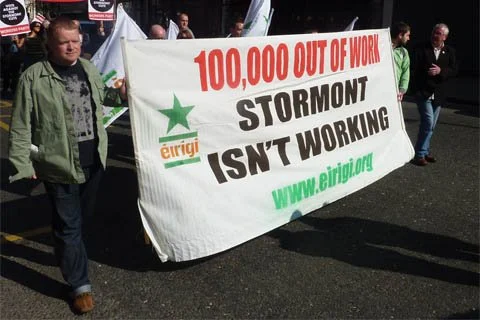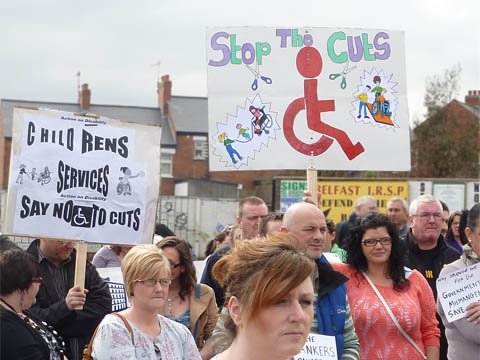Opposition Growing To Stormont Cuts
If the anti-social cutbacks being planned by the British government and its Stormont administration are to be defeated, an unprecedented coalition of working class communities, leftist political parties and trade unions will have to emerge.
A small step in this direction was taken in Belfast over the weekend.
Last Friday [March 25], over 150 community activists gathered at the Andersonstown Barracks site in the west of the city to demand an end to the Stormont-sponsored attacks on the community sector.
Among the crowd were plenty of Éirígí activists, including John McCusker and Pádraic MacCoitir, the party’s candidates for the Upper and Lower Falls constituencies in May’s local government elections.
As the most socially and economically deprived area in the Six Counties, West Belfast depends on the community sector like no other, yet workers in childcare, healthcare, adult education, disability services, youth services and welfare are all on protective notice as a result of the cuts.
Niall Enright of the Falls Community Council’s community drugs program, who chaired the rally, said: “Hopefully today is the start of West Belfast community activists organising major opposition to cuts and we hope that opposition grows in the coming weeks and months.”
On Saturday [March 26], thousands marched through Belfast city centre in support of adequate public services and in opposition to Tory targeting of public sector staff and working class communities.
Éirígí activists, displaying a banner declaring 100,000 Out of Work – Stormont Isn’t Working, were among the crowd.
To pretend that sufficient opposition exists at present to the slash and burn agenda of the establishment parties at Stormont and their British government paymasters would be folly.
However, the events of the weekend prove that the potential exists to build that opposition.
Working class people are angry and they are only too aware of who is to blame for the latest economic crisis they are being forced to pay for; what they need now is a vehicle to express that anger.
It is up to everyone who calls themselves an activist – community, political or otherwise – to provide that vehicle. Éirígí will not be found wanting.




